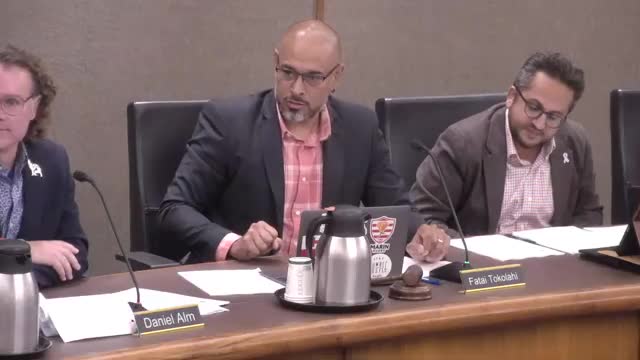RIPA working group recommends against immediate ban on pretext stops; proposes equity dashboard and further review
Get AI-powered insights, summaries, and transcripts
Subscribe
Summary
A PAC working group reported Oct. 15 on Racial and Identity Profiling Act (RIPA) recommendations. The group recommended withdrawing a proposal to pilot eliminating pretext stops, urged an equity dashboard and expanded bias‑training, and faced strong public criticism over process and data access.
At its Oct. 15 meeting, the San Rafael Police Accountability Committee received an update from a working group formed to examine recommendations related to the Racial and Identity Profiling Act (RIPA).
The RIPA working group (members Davitti, Kamina and Chair Tokalahi) described three months of meetings and research. The group said it reviewed San Rafael traffic‑stop data, the 2024 RIPA report, and comparative practices from other agencies and recommended four principal outcomes: an improved "bias by proxy" policy (already updated), withdrawal of a one‑year pilot to eliminate pretext stops, development of performance metrics tied to policy changes, and establishment of an annual equity assessment or dashboard.
"Reducing the number of stops does not necessarily eliminate racial disparities while raising serious public safety concerns," the working group reported, citing findings from comparative data in Los Angeles and a concern that a large reduction in stops could reduce DUI enforcement, firearms recoveries and other enforcement actions. The presenters noted San Rafael data showing 111 DUI arrests from January to July 2025, with a subset originating from mechanical or administrative stops.
The group proposed, instead of an immediate pretext‑stop pilot, forming a two‑member work group to design a public, visual equity dashboard showing stops, demographics, arrests, use of force and complaints, and to recommend data sources and reporting priorities.
Public comment was strongly critical of the working group report and the process used to produce it. Tammy Edmonson of MV Free said the working group relied on "one‑sided data" and argued the committee previously had heard expert testimony and evidence supporting RIPA recommendations. A number of other speakers — including MV Free members and local residents — urged the PAC not to abandon the pilot earlier approved by the full committee and to rely on the broader evidentiary record when making decisions.
Committee members sought procedural clarity. Staff and the city manager clarified that the working group’s presentation was informational: the PAC’s prior vote to forward RIPA recommendations to the city council remained on the record unless the full PAC chose to change it in a later formal vote. Member Locks moved to ask the working group to continue data collection and update the PAC next month, but later withdrew the motion after discussion about next steps and procedural options.
No committee vote altered the May recommendation that the PAC previously forwarded to the city council. The working group’s findings will be included in the PAC’s annual report; committee members and members of the public asked staff to provide more of the underlying data and to ensure future working‑group analyses include the full set of expert submissions and RIPA evidence.
The working group asked for volunteers to form the equity dashboard subcommittee; staff said they would solicit members and return with an updated report when more data has been gathered and validated.
